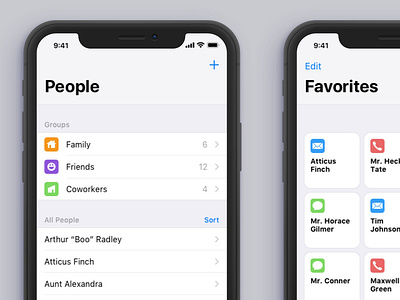People App
One of the older uses of computers was to manage contacts. Along with other desk accessories, calculator, calendar, etc. the Rolodex managed to move itself from the desktop to the Desktop. Databases are easy for computers to handle, so it's a natural fit. But unlike a lot of applications, the Address Book hasn't changed much over the years.
Our current Contacts apps are full data we've collected about other people. It's out of date and inaccurate. It has things people wish we didn't have. Anyone can share the data they've collected with anyone else. App developers can easily ask for this information (and most people will give it to them).
This is a backwards system. You should be the owner of your contact information. You should grant access to others deciding who can see what specific pieces of information. Ironically the one company that seems to best share this view is the one people trust the least to handle this kind of data: Facebook.
I'd like to see a solution from a more privacy-conscious tech company (Apple) that takes this approach with a privacy-first solution. They'd need to offer a cross platform solution, since the problem of preventing your data from being shared can only be solved if a significant marketshare adopted the platform. Say for example Apple migrated all iOS and Mac users' contact lists to this new system with the next iOS update. An android, and even windows version would be in order, but iTunes and Apple Music have made their rounds, so why not.
I'd suggest Apple call this platform "People". In line with their other obviously-named applications. Here's how I see some of it working: The first thing People does is import your existing contact card. You own your data, and you control it. It's your virtual business card. But you won't have just 1, you'll have a few variations. One for family and close fiends, with birthday, phone, emails, address, etc. Another for coworkers or acquaintances, maybe with social accounts and email, but nothing too personal. You might make one specifically to share at a conference, or one just for personal use with sharing disabled, and so on.
Of course, you can easily share one of your cards with anyone nearby (and get theirs). But a shared card is not just sent once. It's a subscription. If you change your phone number or if you move you'll be able to push the updates out to anyone who is subscribed. You'll also be able to block anyone, revoke access, or prevent someone from sharing your card. Conversely you'll be able to upgrade to the next level. For example if you become close friends with a coworker, they'll be able to request access to the Close Friends version of your card. You'll also be in control of what of your information can be shared with third party developers.

